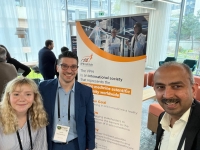With around 60 participants amongst which were cardiologists, regulatory bodies and scientists, the event sparked insightful discussions on the latest advancements in cardiovascular digital twins.

On 26 March 2025, VPHi participated in the InnovaHeart workshop at Future4Care in Paris. The event was co-organised by inHeart and Inria through the EIT Health project inEurHeart and the EU funded project SimCardioTest, the French project MediTwin together with Dassault Systèmes, VPHi, Universitat Pompeu Fabra, Charité UniversitätsMedizin & Boehringer Ingelheim.
The workshop featured a dynamic mix of lectures, talks, and live demonstrations, structured around four key themes:
I: Hybrid Digital Twins and AI
II: Prediction and Prevention
III: Virtual Interventions
IV: Human Digital Twins and Society
The core of the discussions revolved around hybrid digital twins, merging AI and physics-based models, to predict heart failures, optimise therapies, and perform digital interventions, such as valve implantation and left-atrial appendage occluders.
Among the talks, Jan Bruning (Charité) showcased hybrid models for therapy management of mitral insufficiency; Francesco Migliavacca (Politecnico di Milano) discussed the use of virtually validated transcatheter aortic valve implantation in clinical practice and introduced the next VPH Conference, set to take place in Milan in 2026; and Valerie Centis (Microport) delivered an engaging talk on the challenges of medical device regulation (MDR 2017/745).
The VPHi played an active role in the Human Digital Twin and Society session, contributing with a talk by the science communicator Davide Montesarchio, who emphasised the importance of stakeholder engagement and communication, presenting the In Silico Medicine Info Kit, a valuable resource designed to help the scientific community to engage with different audiences.
The session fostered rich discussions on the ethical, legal, and societal dimensions of digital twins in healthcare.
The event was a resounding success, with participants expressing both satisfaction and strong interest in continuing this initiative even beyond the conclusion of the SimCardioTest project.